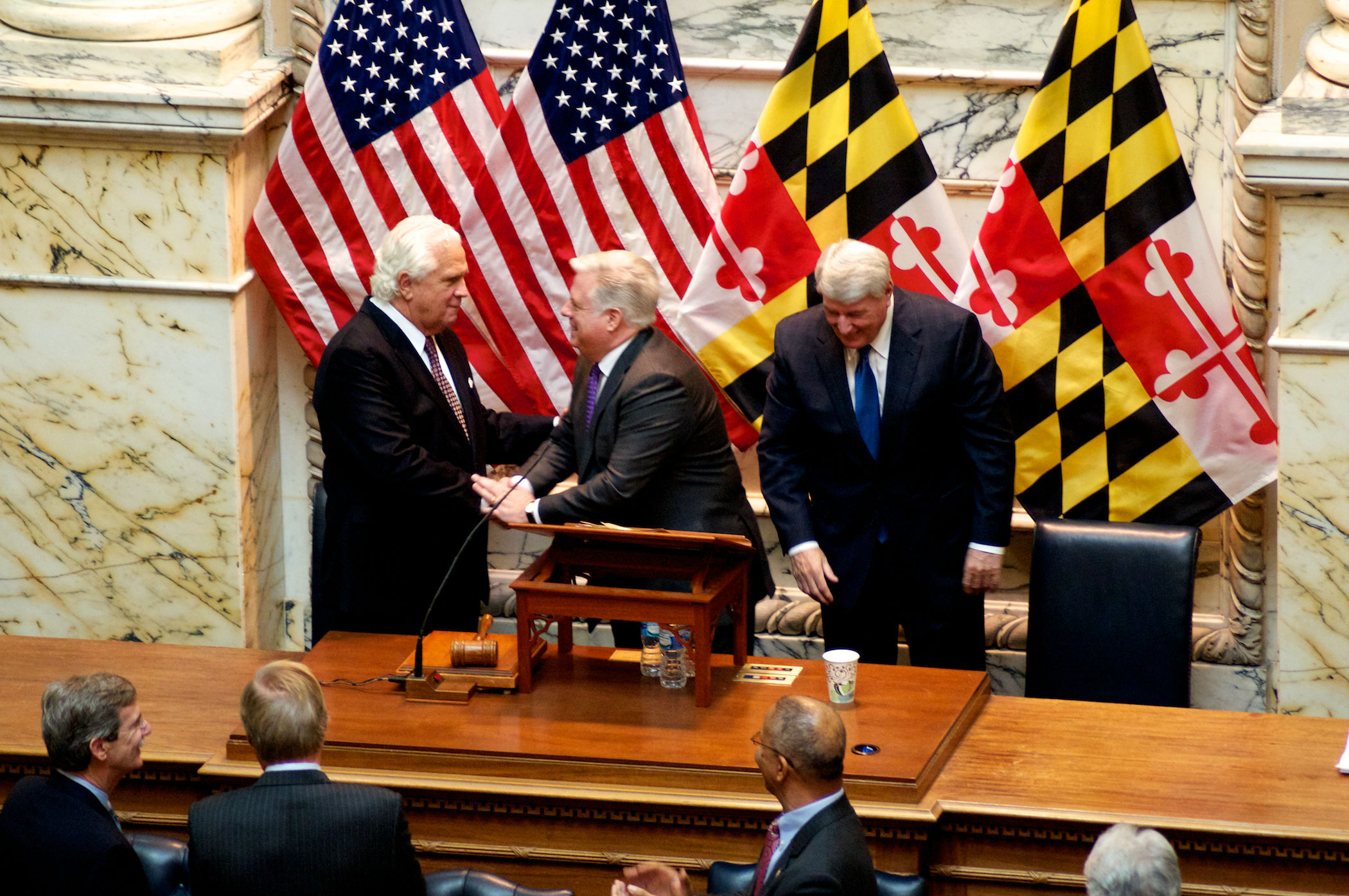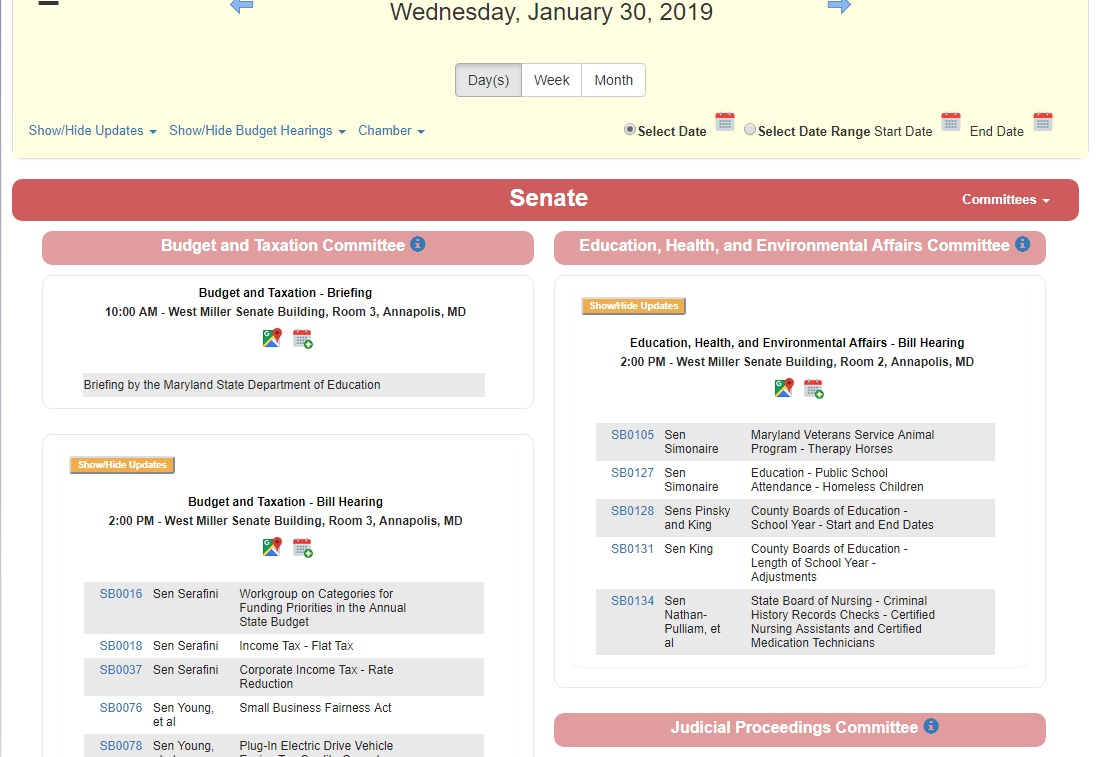Photo Above: Prior to his State of the State address, Gov. Larry Hogan, middle, shakes hands with Senate President Mike Miller and House Speaker Michael Busch looks on.
By Barry Rascovar
For MarylandReporter.com
If there is one area where Gov. Larry Hogan Jr. can sing “kumbaya” with Maryland legislators, it is economic development. The path has been blazed for him by the legislature’s Augustine Commission.
A year ago, top Democrats in the General Assembly recognized Gov. Martin O’Malley had badly dropped the ball on growing jobs in Maryland. So they assembled a commission, led by former Lockheed Martin Corporation CEO Norm Augustine, with the assignment of suggesting how to turn things around.
The group made 32 recommendations, all sensible and none of them particularly novel. It won’t take much for the Republican governor and Democratic legislators to find agreement on most of those suggestions.
Underlying the bipartisan nature of the commission is the fact that Hogan’s new budget secretary, former State Sen. David Brinkley, served on the panel alongside Republican Del. Wendell Beitzel. Two key Democratic chairmen, Del. Dereck Davis and Sen. Ed Kasemeyer, served on the commission, too.
Key recommendations:
- Consolidate economic development programs, develop one-stop shops for businesses and put more emphasis on technology industries.
- Reverse the state’s hostile, rule-enforcement driven approach toward businesses through customer-service training and a new, “what can I do to help?” attitude.
- Invest state money in university-generated business development and address the needs of underperforming public schools.
- Focus on unskilled high school graduates who need vocational training and apprenticeship programs.
One of the more shocking findings of the commission is that 44 percent of kids in Maryland public schools qualify for free or reduced-price lunches, and most of them come from minority families struggling to eke out a living.
The Commission said the state’s public schools aren’t giving them the right kind of education. These kids graduate without the tools to find jobs. Their path up the economic ladder is blocked.
Unskilled and unemployed
Even worse, there are jobs out there for them — some 132,000 currently unfilled positions in Maryland. Employers told the commission they simply cannot find in-state workers who possess the right technical skills.
This glaring mismatch between education preparedness and job qualifications is one of society’s neglected weaknesses. Educators haven’t addressed it. Neither have the politicians.
They are too focused on creating college-prepared students. Those from the lower rungs of education are left to flounder with few, if any, employable skills.
Quick fixes
Hogan and legislators can start addressing this situation with some quick fixes.
Find a pot of money for the state’s community colleges, which already lead in offering job-training and apprenticeship programs. What’s missing has been a major financial investment from the state and local governments in these specialized skills courses.
The state also needs to offer local school systems extra funds if they are to bring back vocational education in a big way.
High school students, especially those not interested in college, should be pursuing career paths and job-readiness courses.
Such an approach is sorely needed in low-performing districts like Baltimore City and Prince George’s County and in rural jurisdictions where employment opportunities are limited.
Singing in unison
The good news is that both Hogan and Democratic leaders in the General Assembly are singing from the same hymnal.
An even better sign: The Augustine Commission concluded what’s really needed is “a cultural change” that depends “on leadership, not money.”
If each side fully commits to the objectives laid out by the panel, Maryland actually could make progress in growing its business base and creating a workforce that is job-ready.
Barry Rascovar’s blog can be found at www.politicalmaryland.com. He can be reached at brascovar@hotmail.com.






These proposals will not increase jobs in Maryland. They will fatten the bottom line for existing businesses, however, and that is what they are designed to do. The jobs creation myth is just cover for this taxpayer subsidy for businesses. The reason jobs are not increasing in Maryland is the same as the rest of country, all of the gains in income are going to the tiny % at the top, and people do not have money to spend in the economy, to create the demand that creates the need for jobs. Businesses do not create jobs, customers create jobs by their demand for goods and services that businesses provide. Without a growing customer base, with growing incomes, no business will be hiring new workers. I love it when tax welfare queens like Lockheed Martin complain about people not having the technical skills they need. Of course they lack these skills. Businesses like Lockheed only want to hire someone who has performed the exact task before. They’re never willing to train workers on the job and they always want their taxes lowered, but then they call on government to pay for the training in the public schools. Lockheed has gotten hundreds of millions in tax breaks over the last few years. Why not invest some of this welfare in training workers for the jobs they say they need? Here are a few examples of how we have been subsidizing this company, while they whine about the business climate in Maryland. More than 80% of the company’s worldwide sales in 2010, 2009, and2009 were to the U.S. government. The Domestic Production Activities Deduction saved the company $110 million, $39 million,and $67 million in 2010 and 2009. The research and experimentation tax credit saved the company $43 million, $43 million and $36 million in the same years. Excess tax benefits from stock options reduced federal and state taxes by $21 million and $92 million in 2009 and 2008. Accelerated depreciation saved the company substantial amounts in all three years.
As a dark horse delegate candidate in Prince George’s County in 2014, I made a shift of funding for vocational education to our excellent community college system from both higher education and K-12 state funding a key plank in my platform. Nationally ranked institutions like AACC are ready, able and willing to do vo-tech in a way that makes these skills a pathway to the middle class. U of MD cannot do this efficiently, and vo-tech in a regimented high-school setting has always been a parking lot for young people intended to artificially boost attendance and graduation rates.
The other Augustine Commission recommendations mentioned by Rascovar sound like fairly sophisticated special interest pleading: Subsidize us now for future pie-in-the-sky.
Moreover, the Commission overlooked the other vital part of the employment-boosting algorithm: demand. If MD businesses can rely on an expanding supply of really cheap labor, they will not make the effort to recruit and train Maryland working class citizens. The easiest and cheapest way to remedy this is to end Maryland’s decades-old policy of encouraging the settlement of illegal aliens. We need to repeal the terrible 2012 legislation giving illegals drivers licenses and college tuition subsidies in favor of first native African Americans and second other HS educated citizens.
Another relatively cost-free remedy would be to mandate state-wide E-Verify work authorization by all employers. Businesses that are not viable without cheap unauthorized workers as their base labor force invariably engage in other retrograde practices that do nothing to promote the innovation and productivity that are vital to economic advancement on a state-wide level. Access to illegal labor is a massive corporate welfare subsidy and redistributes income from working citizens to inefficient corporate interests.
A third easy remedy would be to retain the gas tax despite the drop in oil prices and dedicate it to road infrastructure maintenance and improvements. This is a very progressive tax based entirely on marginal energy consumption. The Governor should invest political capital to insure that transportation funds are not diverted to budget-balancing in the state’s Dinocrat tradition, nor wasted on obsolete technology like the Purple Line.
The combination of community college driven vo-tech reform to boost labor supply, suppression of illegal alien hiring to boost labor demand for taxpaying American workers, and safeguarding state tax funding as capital for job-creating infrastructure maintenance programs is the trifecta that Maryland needs now.
Irony of ironies that what the Governor was blasted for at his State of the State address is being reiterated by the Augustine Commission. Same message, different speaker!